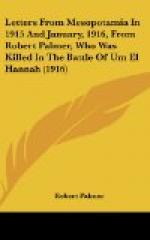To his father.
I have written all the news to Mamma this week. The chief item from my point of view is that, as I cabled to you, I am to take a draft from our two Agra Double Coys. to reinforce the 4th Hants, who are now at Nasiriya on the Euphrates. I got the wire asking me to do this on Sunday, but have heard no details since (this is Thursday night), so I presume they know nothing more at Agra or the Major or Luly would surely have written.
On the other hand the Major wants me back in Agra by Saturday, so I suppose I shall be starting some time next week, but unless I hear before posting this I can tell you nothing of the strength or composition of the draft or the date of sailing.
Everyone insists on ([Greek: alpha]) congratulating me for going to a front and ([Greek: beta]) condoling that it is the P.G. I don’t really agree with either sentiment. I’m afraid I regard all war jobs as nasty, and the more warlike the nastier, but I do think one ought to taste the same cup as all one’s friends are drinking, and if I am to go to any front I would as soon go to the P.G. as anywhere. It will be a new part of the world to me and very interesting. The only bore is being separated from the regiment.
Friday.—I had a talk on Wednesday with a Chaplain just returned from Basra, and he told me we’re likely to stand fast now holding the line Nasiriya-Awaz (or some such place on the Tigris). An advance on Baghdad is impossible without two more divisions, because of the length of communications. There is nothing to be gained by advancing to any intermediate point. The only reason we went as far as Nasiriya was that it was the base of the army we beat at Shaiba, and they had reformed there in sufficient strength to be worth attacking. This is not thought likely to happen again, as the Dardanelles will increasingly absorb all Turkey’s resources.
It seems to me that what is wanted here pre-eminently is thinking ahead. The moment the war stops unprecedented clamours will begin, and only a Government which knows its aim and has thought out its method can deal with them. It seems to me, though my judgment is fearfully hampered by my inability to get at any comprehensive statement of most of the relevant facts, that the aim may be fairly simply defined, as the training of India to self-government within the Empire, combined with its good administration in trust meanwhile. That gives you a clear criterion—India’s welfare, not British interests, and fixes the limit of the employment of Indians as the maximum consistent with good government.
The method is of course far more difficult and requires far more knowledge of the facts than I possess. But I should set to work at it on these lines:—
1. Certain qualities need to be developed, responsibility, public spirit, self-respect and so on. This should be aimed at (i) by our own example and teaching, (ii) by a drastic reform of higher education.




